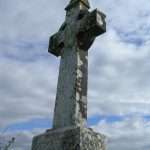Limerick blogger and rugby afficionado and atheist, Bock the Robber asked that I might type a few words on Protestant ‘ethos’ for his blog. Having spent most of my life as a Church of Ireland clergyman, it should have been something that came easily, describing what made us what we are, what shaped our view of the world; except it didn’t.
“Looking for ethos in doctrinal statements or authoritative expressions offers few insights. Church of Ireland doctrine is expressed in the Thirty-Nine Articles of Religion, a sixteenth century statement that sought to follow a middle line between Roman Catholicism on one hand, and a more thorough Protestantism on the other. The articles are a brief outline of beliefs to which clergy ‘assent’, and of which most of the laity have little knowledge. Authority is dispersed, the only body competent to speak for the church as a whole is the general synod, the church’s annual three day parliament. Bishops have little power, even within their own dioceses their decisions must be approved by diocesan councils.
Protestant ethos is something more local, more personal. The perception of the Church of Ireland as being a gathering of tweed and corduroy with English accents endured because people could (and, occasionally, still can) cite examples of landed families who sent their children off to boarding schools in England. Parishes with big house families are less and less common. A typical Church of Ireland parish might have 150 families; even when there is a landed family, there are at least a hundred other families that are, for the most part indistinguishable from the local population.
Protestants in the Republic of Ireland are more likely to be rural dwellers than members of other communities – farmers and small town business people are probably typical. Look at Census 2006 and there is an indication of how much more likely Protestants are to work in the private rather than the public sector. Having once lived in a small, parallel world, they now play a full part in local community life; they take part in local politics, even stand in general elections. There are even Protestants in the Traveller community, though their numbers fell from 646 out of a community of 23,681 in the 2002 Census to 529 from a total of 22,435 in the 2006 Census.
If ethos is shaped by beliefs, by upbringing and by economic status, there can be no single Protestant ethos; at most, one might identify certain traits. From my own experience, there is a dislike and, usually, a disregard, for anything that smacks of the authoritarian; there is a confidence, sometimes over-optimistic, in the capacity for people to ‘improve’ themselves; and there is a perception, which is unfair to people who have had hard lives, that you are what you have made yourself. The traits, in part, reflect the old catechism in the Book of Common Prayer:
My duty towards my Neighbour, is to love him as myself, and to do to all men as I would they should do unto me: To love, honour, and succour my father and mother: To honour and obey all that are put in authority over me: To submit myself to all my governors, teachers, spiritual pastors, and masters: To order myself lowly and reverently to all who are set over me: To hurt no body by word or deed: To be true and just in all my dealing: To bear no malice nor hatred in my heart: To keep my bands from picking and stealing, and my tongue from evil speaking, lying, and slandering. To keep my body in temperance, soberness, and chastity: Not to covet nor desire other men’s goods; but to learn and labour truly to get mine own living, and to do my duty in that state of life, unto which it shall please God to call me.
The Protestant vision of the country might be different, but they love it as much. There are lines in William Trevor’s short story ‘Of the cloth’, written against the background of the Brendan Smyth case, that are presumptuous in attempting to articulate a Catholic view, but present a beautiful Protestant perspective:
‘I never left Ireland,’ Father Leahy said. ‘I have never been outside it.’
‘Nor I.’ The silence after that was part of the dark, easily there, not awkward. And Grattan said, ‘I love Ireland.’
They loved it in different ways: unspoken in the dark, that was another intimation. For Grattan there was history’s tale, regrets and sorrows and distress, the voices of unconquered men, the spirit of women as proud as empresses. For Grattan there were the rivers he knew, the mountains he had never climbed, wild fuchsia by a seashore and the swallows that came back, turf smoke on the air of little towns, the quiet in long glens. The sound, the look, the shape of Ireland, and Ireland’s rain and Ireland’s sunshine, and Ireland’s living and Ireland’s dead: all that.
On Sundays, when Mass was said and had been said again, Father Leahy stood in a crowd watching the men of Kildare and Kerry, of Offaly and Meath, yelling out encouragement, deploring some lack of skill. And afterwards he took his pint as any man might, talking the game through. For Father Leahy there was the memory of the cars going by, his bare feet on the cobbles of the yard, the sacrifice he had made, and his faithful coming to him, the cross emblazoned on a holy robe. Good Catholic Ireland, a golden age.
None of which really answered Bock’s question.
